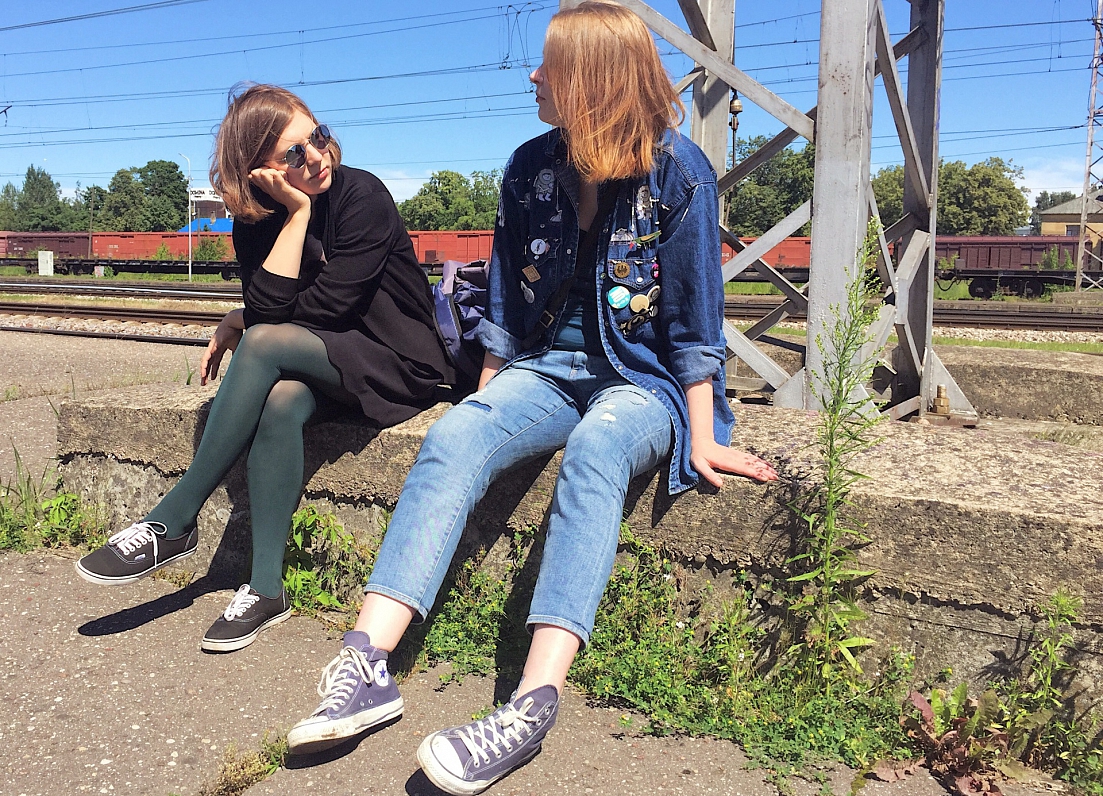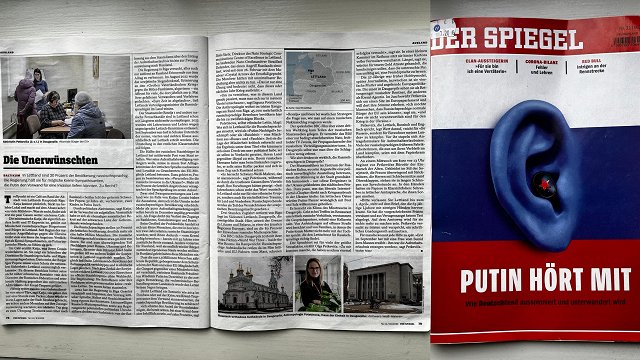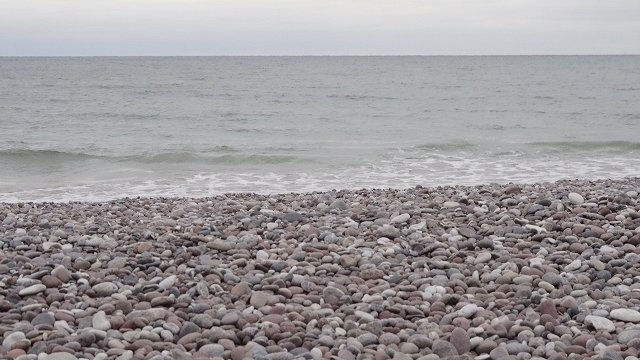After passing the citizenship exam, they had to wait for a letter of confirmation after being vetted by Latvia's government institutions.
Ksenia, who had to wait about 90 days
A period of silence followed after I passed the exam. Two and a half months later I received a letter from the Citizenship and Migration Affairs Office (PMLP). It said that government institutions had discovered no hindrances for me becoming a citizen. It also invited me to a celebratory ceremony on April 26.
While the citizenship applicant keeps living their own life, for example, by drinking pear beer at a Krakow brewery or acquainting themselves with the absurdity and splendor of a Russian resort city, an up to total fifteen institutions are busy checking whether the future citizen has a clean record.
PMLP representative Santa Jonāte sent me a list of the institutions that they request information from:
1. Consular Department of the Foreign Ministry — only if the applicant is a foreigner;
2. Security Police;
3. Finance Police Department of the State Revenue Service;
4. Information Center of the Interior Ministry;
5. Latvian Prison Administration;
6. Corruption Prevention and Combating Bureau;
7. Military Intelligence and Safety Service;
8. Customs Police Department of the State Revenue Service;
9. Military Police;
10. Constitution Protection Bureau;
11. Center for the Documentation of the Consequences of Totalitarianism — only for people who were not minors by or were not born after May 4, 1990.
12. Child Support Guarantee Administration — only for people who have children.
13. State Revenue Service;
14. State Police;
15. State Border Guard — they're contacted if the applicant lives by the border.
As can be understood from this list, Latvia takes vetting its new citizens very seriously. According to Jonāte, the background checks take around a month. But if a procedure gets delayed it means there may have been something unclear. In my case there was a delay because of my parents' citizenship who were married as citizens of the USSR but they became parents when one of them had a Latvian but the other a Ukrainian passport. Luckily enough it got cleared up quickly.
Then I went to the passport ceremony, my conscience clear and my past alike.
Of course the PMLP can request information from other institutions as well and it happens without notifying the subject. The checks usually take around four to six months but can take up to a year. Foreign citizens have to wait the most as they have to renounce their previous citizenship, Jonāte said.
Nevertheless even if you managed to pass background checks it doesn't meant that you get to give your celebratory oath to Latvia a month later, just like that. In order for the ceremony to become larger and more convenient, PMLP try to wait when there are about 70 people to make up a single event. It can also take a bit more if an applicant is issued a misdemeanor charge and hasn't paid the fine.
I had been sure that once they sign the fidelity oath to Latvia, non-citizens receive their passport straight away.
Perhaps not with all the pomp that Mikhail Baryshnikov had, but I still wanted to see at least a shoestring variety of this celebration that testifies to your patriotism and trust in the state. As we'll be telling about the ceremony in another blog post, I'll tell you one thing -- you still have to wait for your passport after the ceremony.
When all the oaths are signed, PMLP prepares a bill for the Cabinet of Ministers. In the end it's at Brīvības street 36 where, once every few months, the government takes the final decision on making someone a citizen.
I became a citizen in early June together with about 40 other people. After a few days every one of us received a letter that explained when the cabinet decision becomes official--it was late June for me. Yep, that's right guys--you'll have to wait a bit. However there's a loophole for the very impatient, of which I'll tell again later.
Waiting is quite probably the least satisfying part of the process. You can fly to Moscow in an hour and a half, or watch a Game of Thrones episode. Changing your official place of residence takes a few minutes on the Latvia.lv website. At this day and age, it's odd that you have to wait several months as dozens of institutions bide their time slowly exchanging emails with you as the subject.
Anna, who had to wait about 110 days
What does 'non-citizen' mean?
On October 15, 1991 the Supreme Council (the interim parliament) granted citizenship to Latvians who were citizens during the inter-war period, and their offspring.
As a result, a third of Latvian residents who were largely Soviet-era immigrants became non-citizens with an ambiguous legal status. During the last 25 years, 150,000 non-citizens have been granted citizenship under the naturalization program. About 250,000 are still non-citizens and don't enjoy certain rights, like the right to vote or hold certain public offices.
Read more about the historical context HERE.
Alīna, who got her citizenship a few years ago:
"I won't vote for a 'Russian' or 'non-Russian' mayor. I'll vote for the one who'll give me cycling paths. But no one does..."
"[Before the ceremony] I asked whether I can refuse the citizenship, as I was plagued by deep doubts. I was told that I can do it, with no financial or criminal responsibility."
"When I went out after the ceremony I started crying .. the thing is, this procedure of obtaining citizenship wouldn't have caused such emotion if I had moved to live here. But I've been living here for 30 years, and had been for 27 at that moment."
In the country I was educated, where I am paying and was paying taxes... And I had to swear an oath. It was, on some degree, humiliating to me."
"I am glad to communicate with speakers of the language, as I find it important to me. I like the language and I'm used to speaking it. I don't like it when I start forgetting so I read articles and books to refresh my knowledge."
"It might be childish but sadly, and by and large, nothing would change [from my vote] .. I cannot imagine who I'd vote for. Because they again offer something for retired people and young families. But I am neither a retired person, nor a young family."
Aleksandrs, a non-citizen:
"I have a feeling I'll apply for citizenship within the next three years after all."
"The benefits of being a non-citizen: visa-free entry into Russia, and I go to St. Petersburg often .. To me it was a sort of a joke, it was interesting to try to figure out how long I'll be able to remain a non-citizen."
"Practical reasons come first and those of a symbolical nature follow .. Citizenship allows you to work in Europe which I cannot do but would like to ... I'd like to go visit Britain, and it's easier to obtain citizenship than to get a visa."
"But there's a psychological layer as well--I want to feel like a citizen .. taking part in the elections is also a part of it. I would want to know how citizenship would affect me psychologically."
"I am quite likely one of the best-integrated non-citizens I know of. I am thinking about learning Latvian on the necessary level because, to my shame, I still cannot speak it quite freely."
"I think a kind of decisiveness was called for to give people citizenship [after the fall of the USSR]. What it would have meant is a question of history but the current result is a deep divide .. I would definitely not carry out experiments like these on my children."
"If I had seen a political power that I would have said 'yes' to, I would go to apply for citizenship the same day. But now I don't see anyone I'd vote for."
Vitalik, waiting for his citizen's passport:
"I have never been a part of this society and I went [to apply] so that I'd have a ticket for departure."
"I applied for the first time some time in 2009. I did not prepare a lot. I was young and angry. I simply came, passed the oral test but failed the writing part."
"The reason [for me to apply was to] have a departure ticket away from the country, and this time I was prepared. I passed on my first try.. You can't leave for Britain without a citizens' passport. I want to move there because a friend of mine lives there."
"I have never considered this place my home, perhaps as I was the first member of my family to be born here. I generally feel out of place here."
"I like the locals, especially the younger generation. Because the Latvian youth with which I often communicate have no preconceptions. I feel comfortable with them."
"I think it's a bastard law, as a professor at the university told me .. You're born in a country and are assigned a strange status, as if you don't belong to it. And as the years go by, you move further and further away from it. You feel like a foreigner in your native land."
"If the powers that be have from the start divided the public you can't speak of any democracy in the future. For they still have this problem they haven't solved."
* * *
I know the feeling of being an alien in the country, but I also know the feeling of belonging. My waiting period was full of ups and downs. Though honestly I wouldn't give a value judgement about it.
Sometimes it seemed to me that I'm a part of many of the happenings in the country. Sometimes it was just the opposite as I felt like a cosmopolitan, as if I have no home because my home is the world.
Sometimes I felt like a perpetual vagabond without any sense of belonging. He knocks on people's doors, tells stories, is given some bread and continues his way. Well, in former times vagabonds did play a rather important role, culturally speaking.
But sometimes I don't want to be a vagabond. I want to surpass my lack of belonging to anything. To look at this feeling more peacefully. Or to feel a sense of belonging. Or maybe understand that it isn't quite as simple as the interplay of black and white.
* * *
We really wanted to give our oaths together, but it so fell that we couldn't. However both of us attended ceremonies (despite that two months separated the one from the other) and they turned out to be somewhat different from one another. We'll be telling about them in our next blog entry.































